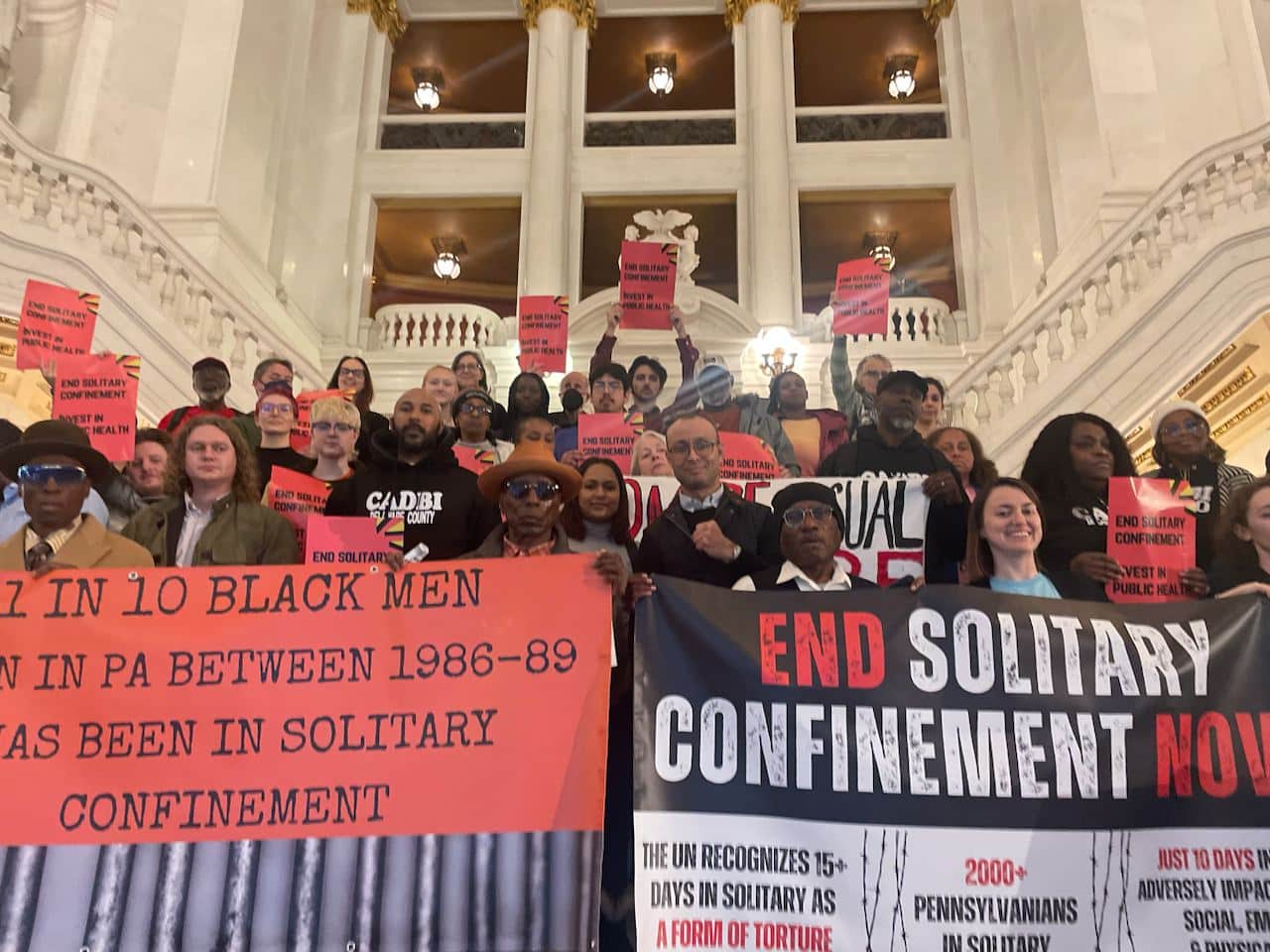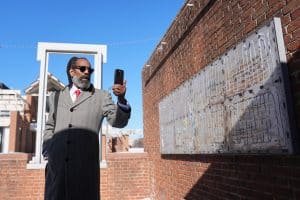When Robert Saleem Holbrook was a minor, he was involved in a crime and served 27 years in Pennsylvania prisons – 10 of those in solitary confinement. His longest uninterrupted time in restrictive housing, Holbrook lived alone in a tiny cell at State Correctional Institution (SCI) Greene in Waynesburg, PA, from June 1996 until August 1999.
During the three decades Holbrook spent in jail, he enrolled in college, studied, and dedicated himself to making a difference for inmates like him. Now a member of the faculty at the University of Pennsylvania Carey Law School, Holbrook uses his experience and education to advocate for others.
As executive director of the Abolitionist Law Center, the organization that recently filed a federal lawsuit against the commonwealth on behalf of six inmates facing indefinite isolation, Holbrook eagerly awaits a legislative remedy that might put the topic of long term solitary confinement to rest.
Weeks ago, Holbrook and other advocates testified before the PA House Judiciary Committee in advance of new protective custody legislation proposed by Bucks County Representative Tina Davis.
Davis and her co-sponsor, Rep Mike Schlossberg of Lehigh County, announced late last year that they would introduce legislation that would prohibit the use of solitary on persons with mental health diagnoses. It would likewise eliminate restrictions of food, bedding and other necessities and mandate a hearing prior to the implementation of restrictive housing punishments.
Davis explained her support for the measure.
“This bill will save taxpayers money in the long term. Studies have shown that solitary confinement has led to greater psychological issues for incarcerated individuals, making it more difficult for them to be rehabilitated and reintroduced into society” she said. “This puts a stress on the social services system and leads to a higher recidivism rate.”
John Rowland, Organizing Campaigns Manager for the Pittsburgh-based Abolitionist Law Center, hopes the legislation will land on lawmakers’ desks soon. In anticipation of Reps. Davis and Schlossberg’s completed bill, allies testified to the House Judiciary Committee earlier this month. The activists, all prior inmates, condemned the use of solitary confinement as both cruel and ineffective. The lone opposing testimony at the session came from Pennsylvania State Corrections Officer Association President John Eckenrode.
While no one from the Pennsylvania Department of Corrections (DOC) testified at the hearing, the DOC released a statement to the committee stating that the use of solitary – or what they call restricted housing – was in the process of being re-evaluated through a pilot program providing confined inmates with additional time out of their cells.
But advocates say that’s not enough.
Holbrook wants systemic change in how inmates are punished. “Three hours out of the cell each day does not address the need for alternatives to solitary. The problems with solitary are ones of accountability and real oversight. Increased time in the yard does not reduce the use of long-term solitary confinement.”
Advocates for change say that policy concerning the use of solitary confinement in Pennsylvania is in a state of constant flux. And it varies from jurisdiction to jurisdiction. Holbrook says that’s because he and other advocates keep fighting the practice in court.
“The Department of Corrections is talking about incremental reforms brought about by the number of lawsuits they’re involved in and are losing,” said Holbrook.
The most recent lawsuit to impact Pennsylvania is a federal class action case intended to end the use of solitary confinement for persons with mental health diagnoses. Holbrook expects the plaintiffs will prevail, but that it will make little difference to the inmates. “It’s a version of whack-a-mole. They lose a case. They close a program. Then they re-open the program under a different name.”
In the DOC’s statement, the current practices include isolating inmates for rule violations, or while the prison staff conduct short term investigations. Restrictive housing is also used for protective custody, to neutralize threats or as transitional placement while inmates await transfer. According to the DOC, prisoners who are diagnosed with “serious mental illness are diverted from restrictive housing and immediately placed in Diversionary Treatment Units.”
Nicholas Emeigh, Director of Outreach and Development for NAMI Bucks County, has first-hand knowledge that individuals with mental illness are placed in solitary. “What everyone fails to realize is that every single jail is the largest mental health facility in their community.” Emeigh – who does regular outreach to prisoners as part of his work with the National Alliance on Mental Illness – says inmates are often placed in solitary explicitly because of their mental illness. “If you say you’re suicidal or don’t want to take your meds, you can go to solitary.” Emeigh laments the cruelty shown to these individuals, “In our prisons we have the suffering Olympics.”
According to the DOC’s statement, whether classified for restrictive housing or diversionary treatment, the terminology used for the incarceration level assigned to these inmates is security level five (SL5).
The DOC statistics for SL5 state that only 7.8 percent of inmates are subjected to such isolated detention for a year or more. Furthermore, the statement claims that approximately 35 percent of inmates in this highest of security settings are sequestered for 30 days or less. Consequently 65 percent are detained for months or years. Emeigh says that these long-term isolations are extremely detrimental to the mental health of inmates.
“If you’re in solitary confinement for six months, that’s torture. That sort of extreme suffering disrupts treatment. If you isolate people for long periods of time it causes significant psychological distress,” said Emeigh. “If you’re in recovery or treatment, solitary derails treatment – worsens symptoms of depression, anxiety, and hallucinations.”
Christobal Kimmenez, executive director of Healing Communities PA, a faith-based prison re-entry initiative, is a pastor and a former inmate. Kimmenez, arrested in the late 1990s on drug charges, served the first 6 months of his multi-year prison sentence in protective custody – aka solitary confinement – because, before he broke the law, he was a federal law enforcement officer. Kimmenez testified to the judiciary committee that his six months in solitary had done more long-term psychological damage than his four combat tours with the United States Marines. And whether it’s solitary confinement or SL5, Kimmenez doesn’t think it matters what name they give to the isolation. “DOC is famous for just calling it something else – administrative segregation.”
According to Kimmenez, even his own protective custody wasn’t about protection, “It’s cruelty. It’s power dynamics.” Kimmenez says that when corrections officers say they, “lock up dangers to the facility. They mean dangers to authority. Putting people in solitary, they aren’t just isolated from the inside, they’re isolated from their outside lives as well. They separate you and put you in their deepest darkest dungeon.”
Dr. Kevin Dolphin, founder of Harrisburg based Breaking the Chainz agrees. Locked in New York City’s notorious Rikers Prison at 17, Dolphin was sent to solitary confinement “because they didn’t have a place for a juvenile in an adult prison.” While in solitary Dolphin’s mom died. Incarcerated, he couldn’t go to the funeral. But because of his solitary confinement, he wasn’t immediately notified or even allowed to talk to his family on the phone. “Being locked in prison causes trauma. But not until years later did I realize the effect solitary confinement, and being in prison in general, had caused me.”
Governor Shapiro’s 2024-25 budget calls for an additional $5 million to increase the hours – from one to three – that an inmate in solitary confinement leaves their cell. Judiciary committee member Representative Chris Pielli spent decades as a corrections officer earlier in his career and voiced concerns over the additional costs of relaxing restrictions on solitary confinement. “You need more personnel no matter what. I would like to see more studies.”
The Chester County Democrat added, “I don’t want solitary used as a punitive measure, that’s inhumane. If it’s arbitrary it’s inhumane. But there are times when solitary is a tool we need to use. I’m personally willing to keep an open mind to legislation.”
Other members of the committee are more convinced. Representative Christopher Rabb of Philadelphia County sees systemic flaws at every level of the penal system.
“The majority of people in prison have drug addiction or mental illness,” said Rabb. “The large majority of inmates are illiterate or semi-literate, have mental illness or drug addiction. We are criminalizing poor education, mental health and addiction; while not making us any safer.”
Kimmenez echoes Rabb’s sentiment. “All the research tells us is that the root cause of crime is poverty. What makes our communities worse are the years of disinvestment, years of red lining, years of abject poverty. We can’t handle poverty with punishment.”
Holbrook, like Rapp, believes the practice is especially ill-advised for society at large.
“The majority of people who go into solitary confinement and spend long durations in solitary confinement are going home. People are literally losing their minds and then coming back out on the street,” said Holbrook. “It has become a public health and public safety issue.”







